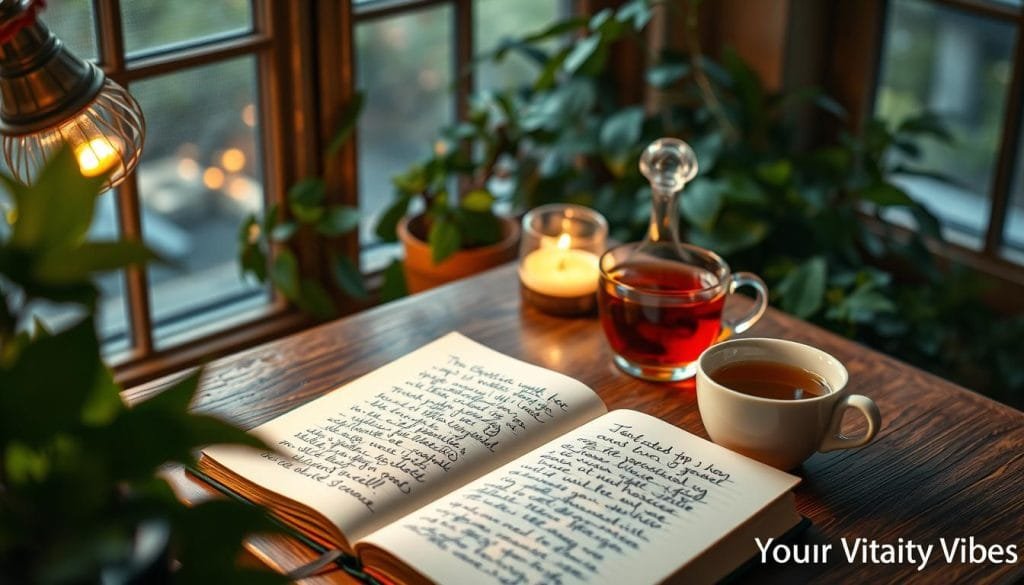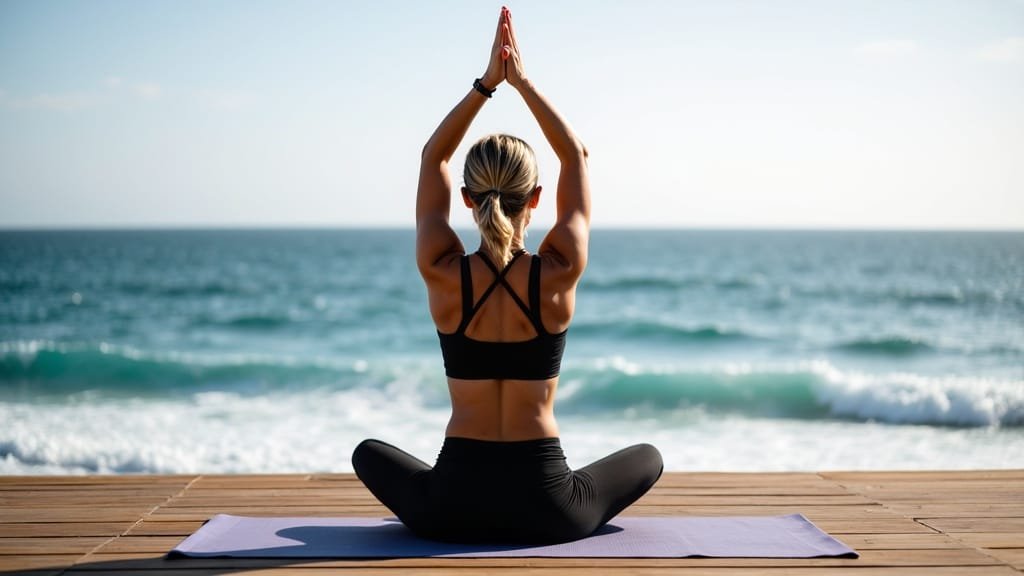In this article, we’ll look at five natural ways to cut down stress and find peace. We’ll cover deep breathing, mindfulness meditation, and more. These easy techniques can help you handle stress and feel better without medication.
Whether you want to ease anxiety, relax more, or balance your life, we’ve got you covered. These strategies are designed to help you find calm and well-being.
Key Takeaways
- Discover the power of deep breathing to calm the mind and body
- Explore mindfulness meditation as a tool for stress management
- Understand the benefits of incorporating yoga into your routine
- Learn low-impact exercises that can help reduce stress naturally
- Uncover the healing properties of nature and outdoor activities
The Power of Deep Breathing
In today’s fast world, stress can feel too much. But, our breath might hold the secret to relief. Deep breathing is a simple yet powerful tool for calming the mind and triggering the body’s relaxation response.
Techniques to Calm the Mind
The 4-7-8 method is a great deep breathing technique. You breathe in for four seconds, hold for seven, and breathe out for eight. Doing this cycle can lead to deep relaxation and peace. Box breathing is another method. It involves breathing in for four seconds, holding for four, exhaling for four, and holding again for four before starting over.
Benefits of Mindful Breathing
- Lowers blood pressure and heart rate
- Reduces anxiety and stress levels
- Improves sleep quality
- Enhances focus and concentration
- Boosts overall well-being and emotional regulation
Adding these mindfulness, stress relief, and relaxation techniques to your day can bring calm and balance. Deep breathing can open the door to a more resilient and joyful life.
“Breathing is the foundation of all meditation practices, and it’s the most powerful tool we have to calm the mind and body.” – Dr. Deepak Chopra
Embracing Mindfulness Meditation
In today’s fast world, managing stress and anxiety is key. Mindfulness meditation is a powerful tool. It leads to inner calm and emotional well-being.
Mindfulness meditation teaches us to be present. We observe our thoughts and feelings without judgment. This helps us break free from worry and rumination.
Starting mindfulness meditation is easy. Just sit quietly for a few minutes each day. Focus on your breath. When your mind wanders, gently bring it back to the present.
“Mindfulness is not about fighting your thoughts; it’s about observing them with compassion.”
The benefits of mindfulness meditation are amazing. It can reduce stress and anxiety, improve sleep, and boost brain function. It helps us find peace and self-awareness.
Why not start with mindfulness meditation? Take a few moments each day to be present. It’s a journey of growth and stress reduction. Your mind and body will appreciate it.
Yoga: A Path to Inner Peace
Yoga is a powerful practice that helps us reduce stress and find inner peace. It combines physical postures, breath work, and meditation. This holistic approach helps us manage daily life demands.
As we explore yoga, we’ll look at beginner-friendly poses. These poses help us cultivate calm and relaxation.
Beginner-Friendly Yoga Poses
The child’s pose is a great pose for beginners. It’s gentle and helps us focus on our breath. It also releases tension and grounds us.
The downward-facing dog is another stress-reducing pose. It strengthens our arms and legs. It also makes us feel open and released.
The tree pose improves balance and stability. It helps us feel tranquil and focused. We root down through one leg and reach up through the crown of the head.
By adding these poses to our daily routine, we connect with our bodies and minds. Yoga offers a path to inner peace, helping us face life’s stresses with ease and resilience.
“Yoga is the journey of the self, through the self, to the self.” – The Bhagavad Gita
Reduce Stress Naturally with Exercise
Exercise is a great way to manage stress. It not only helps reduce stress symptoms but also boosts your overall health. Adding low-impact workouts to your routine can bring mental and physical benefits.
Low-Impact Workouts for Stress Relief
Low-impact exercises are excellent for stress relief and anxiety reduction. Here are some activities that can help you relax and feel better:
- Walking: A simple yet effective exercise, walking can be a great way to clear your mind and reduce stress. Aim for 30 minutes of brisk walking several times a week.
- Swimming: This low-impact, full-body workout can be incredibly soothing, as the water helps support your body and alleviate the stress on your joints.
- Gentle Strength Training: Incorporating light resistance training, such as bodyweight exercises or gentle weightlifting, can help release muscle tension and boost your mood.
By doing these exercises, you can see the amazing benefits of stress relief and feel more in control of your well-being.
“Regular physical activity can be a powerful tool for managing stress and promoting overall well-being.”
| Exercise | Benefits for Stress Relief | Recommended Duration |
|---|---|---|
| Walking | Clears the mind, reduces tension | 30 minutes, several times a week |
| Swimming | Full-body workout, low-impact | 30-45 minutes, 2-3 times a week |
| Gentle Strength Training | Releases muscle tension, boosts mood | 20-30 minutes, 2-3 times a week |
The Healing Properties of Nature
Being in nature can greatly improve our mental and physical health. Studies show that nature can lower stress and anxiety. The sounds of leaves, the smell of flowers, and the beauty of forests can calm us and bring peace.
Outdoor Activities to Unwind
There are many outdoor activities that help us relax and find peace. Here are a few:
- Hiking: Going on a trail can be exciting and connect us with nature.
- Gardening: Taking care of plants can be calming and good for our well-being.
- Forest Bathing: This Japanese practice in forests can lower stress and help us relax.
These activities let us use nature’s power to reduce stress and anxiety. Whether it’s a quick park visit or a mountain hike, nature can help us feel better.
“In every walk with nature, one receives far more than he seeks.” – John Muir
Next time you’re stressed, try going outside. Nature can calm your mind and body. It’s good for your mental health.
Journaling: A Therapeutic Release
Journaling is a powerful tool for stress relief and personal growth. It lets us express our emotions and gain insights into our inner world. This practice can be customized to fit your needs, making it a rewarding self-care activity.
Journaling helps us process and release emotions. It’s a safe space to deal with thoughts and feelings. This can be especially helpful when we’re feeling overwhelmed or anxious.
Journaling also boosts self-awareness and personal growth. By writing about our experiences and goals, we gain clarity. This clarity helps us make better choices and practice self-care.
Adding journaling to your daily routine is simple. Choose a time that works for you, like morning or before bed. Start with a simple question, like “What am I grateful for today?” and let your thoughts flow.
“Journaling is not just about the written word – it’s about the therapeutic release that comes from the act of writing itself.”
There’s no one “right” way to journal. Try different styles, like bullet points or doodles. Journaling’s beauty lies in its flexibility, allowing you to create a personal and meaningful stress relief experience.
Discover the transformative power of journaling. It can bring inner peace and clarity. By making journaling a part of your self-care, you’ll manage stress better and live a more balanced life.

Prioritizing Self-Care
In today’s fast-paced world, taking care of ourselves is key. Simple self-care habits can help us recharge and live a healthier life. They also help us manage stress and find balance.
Simple Self-Care Rituals
One easy way to care for yourself is by taking a relaxing bath. Adding scents like lavender or chamomile can calm your mind and body. Reflecting on what you’re thankful for is another way to reduce stress.
Doing things you love is also important for self-care. This could be reading, trying a new craft, or enjoying nature. Spending time on activities that make you happy can ease stress and anxiety.
| Self-Care Ritual | Benefits |
|---|---|
| Relaxing Bath | Calms the mind, soothes the body |
| Mindful Gratitude | Reduces stress and anxiety |
| Engaging in Hobbies | Fosters joy and relaxation |
By making these simple self-care habits a part of our lives, we can improve our well-being. Remember, self-care is not a luxury but a must for our health. It helps us deal with stress and anxiety reduction.
The Art of Saying No
In today’s fast world, we often feel overwhelmed. Learning to set healthy boundaries is key for stress management and anxiety reduction. Saying no to things that don’t fit our values helps protect our mental health and reduces stress.
Prioritize Your Time and Energy
We can’t do everything. It’s important to choose wisely and say no to things that don’t benefit us. This might mean skipping social events, turning down work, or setting limits with family. Doing so helps us focus on what’s truly important to us.
Strategies for Boundary Setting
Saying no can be tough, but it’s a skill we can learn. Here are some ways to set healthy boundaries:
- Be polite yet firm: Say “I’m afraid I can’t do that right now” or “That doesn’t work for me.”
- Offer alternatives: If you can’t do the whole thing, suggest a compromise or something else that fits your schedule.
- Explain your reasons: Share why you can’t do it, like other commitments or needing time for yourself, without overexplaining.
- Practice self-compassion: Remember, setting boundaries is caring for yourself. It’s not selfish.
By learning to say no and setting boundaries, we can take back our time. This reduces stress and helps us live a more balanced, fulfilling life.
Unleash Your Creativity
Doing creative activities can really help you relax and feel less stressed. You might enjoy painting, writing, or making something new. It’s a great way to find flow, calm your mind, and feel proud of what you’ve made. Let’s explore your creative side and see how it can help you.
Research shows that creative activities can lower anxiety and make you feel better. When you get lost in a creative task, you forget about everyday stress. This flow state is very calming and makes you feel happy.
If you’re just starting with creativity, don’t worry. There are many ways to be creative, from simple doodles to big projects. Try:
- Painting or drawing
- Journaling and creative writing
- Crafting, like knitting, pottery, or scrapbooking
- Photography or videography
- Cooking or baking new recipes
Just pick something that makes you happy and fulfilled. Enjoy the journey, not just the end result. Creating, no matter how good you are, is very calming and stress-relieving.
“Creativity is a way of living life, no matter our vocation or how we earn our living.” – Madeline L’Engle
So, what are you waiting for? Let your creativity shine and see how it can help you relax. Whether it’s a quick doodle or a weekend class, enjoy the process and let your inner artist out.

Build a Supportive Network
Managing stress and anxiety gets easier with a strong support network. Being around positive, caring people gives you emotional support and a sense of community. This helps you face life’s challenges better. You’ll also find a place to reduce stress, anxiety, and get social support.
The Power of Positive Relationships
Having good relationships with family, friends, and loved ones helps with stress relief. These connections offer a safe place to share and get listened to. Doing things together also makes you feel part of a community.
Research shows people with strong social support systems feel less stressed and are happier. Having a network that cares about you gives you emotional support and new views. It helps you deal with life’s tough moments.
| Benefits of a Supportive Network | Strategies for Building Connections |
|---|---|
|
|
Positive relationships offer emotional support, a sense of belonging, and a safe space. By investing in a supportive network, you unlock stress-relieving and anxiety-reducing benefits. This makes life’s ups and downs easier to handle.
“The greatest weapon against stress is our ability to choose one thought over another.” – William James
Reduce Stress Naturally with Aromatherapy
Aromatherapy uses essential oils from plants to help reduce stress and relax. These oils have powerful properties that can bring balance to our busy lives.
Research shows that oils like lavender, bergamot, and chamomile calm the mind and body. They work by affecting the olfactory system and the limbic system. This part of the brain handles emotions and memories.
Adding aromatherapy to your day is easy. Just use a diffuser with a few drops of your favorite oil. Or, apply a small amount to your wrists or temples. This way, the oils can be absorbed or inhaled, helping to lower stress.
For a deeper experience, add essential oils to your bathwater or use them in a massage. The scent and touch can make you feel relaxed and stress-free.
Aromatherapy is great for managing anxiety and finding peace. It lets you use nature’s power to reduce stress and anxiety. This way, you can find balance and well-being again.
“Aromatherapy is a gentle, natural way to alleviate stress and promote relaxation. The right essential oils can work wonders for your mind and body.”
| Essential Oil | Stress-Relieving Properties |
|---|---|
| Lavender | Known for its calming and soothing effects, helping to reduce anxiety and promote sleep. |
| Bergamot | Uplifting and refreshing, it can help alleviate tension and improve mood. |
| Chamomile | Renowned for its anti-inflammatory and sedative properties, aiding in relaxation and stress relief. |
Conclusion
In this article, we’ve looked at many natural ways to manage stress and improve well-being. We’ve talked about deep breathing, mindfulness meditation, and yoga. We’ve also discussed the benefits of exercise and spending time in nature.
By adding these stress relief methods to your daily life, you can boost your mental and physical health. You’ll enjoy a more balanced life and connect with yourself on a deeper level. Whether it’s mindful breathing, gentle workouts, or nature walks, these natural stress management strategies can change your life.
Starting your journey to reduce stress means being consistent and patient. With self-care and a willingness to try new things, you can face life’s challenges more easily. Embrace these natural solutions and begin your path to a more harmonious and fulfilling life.



